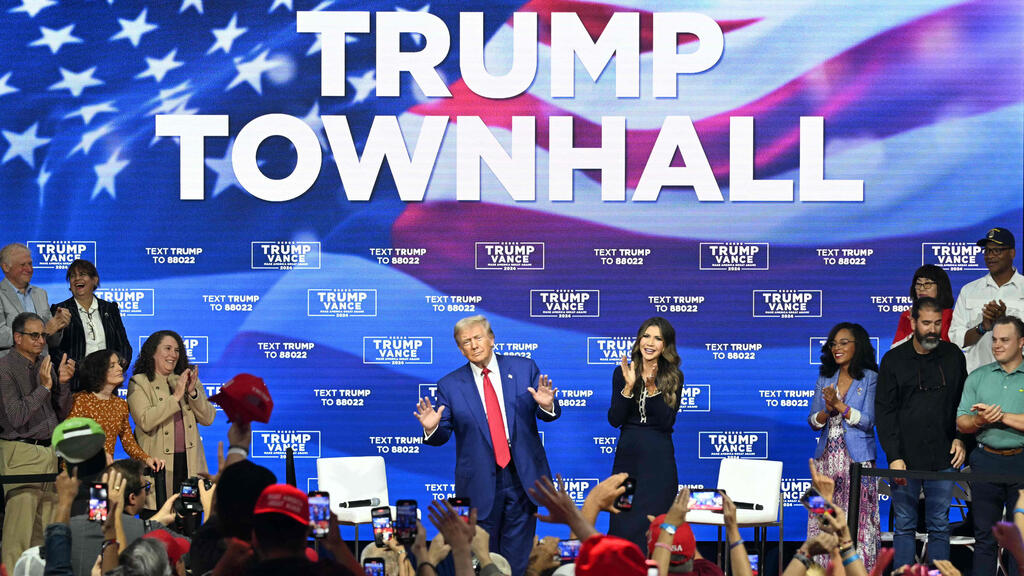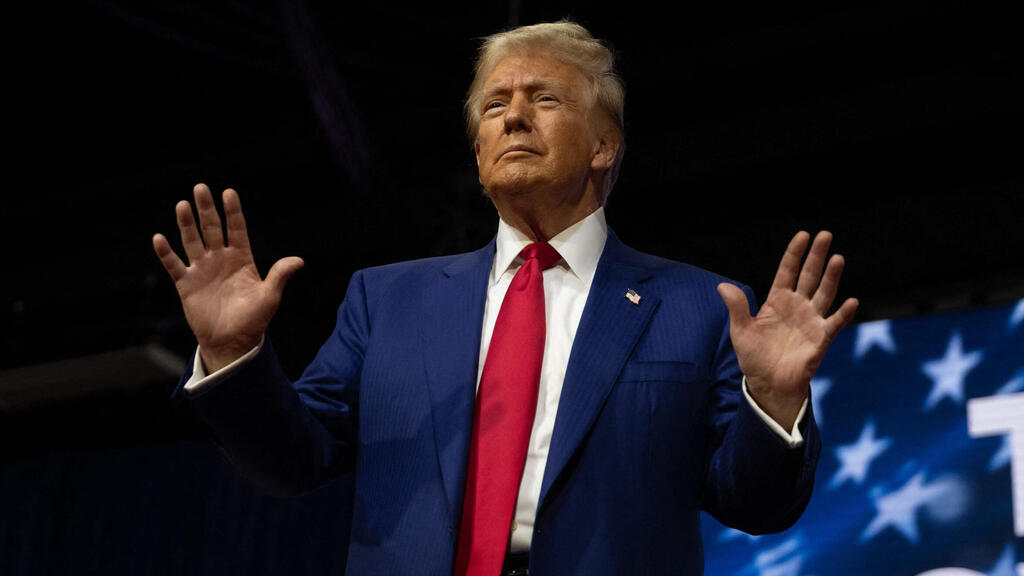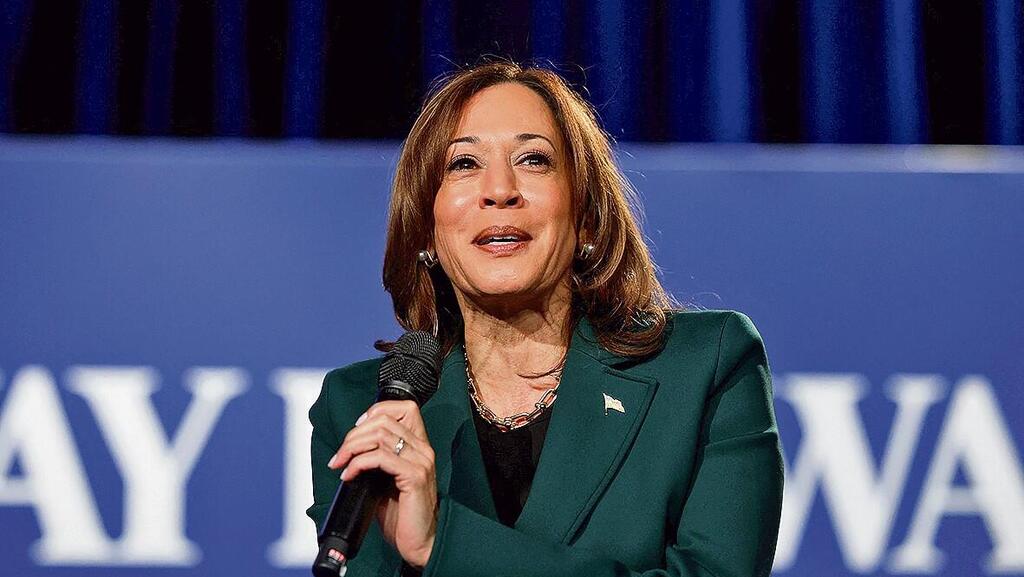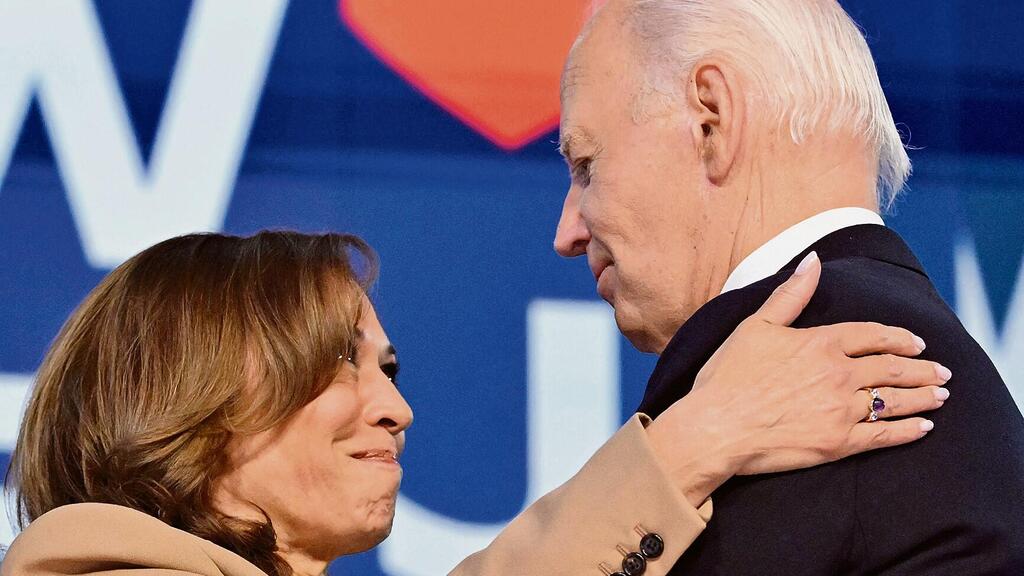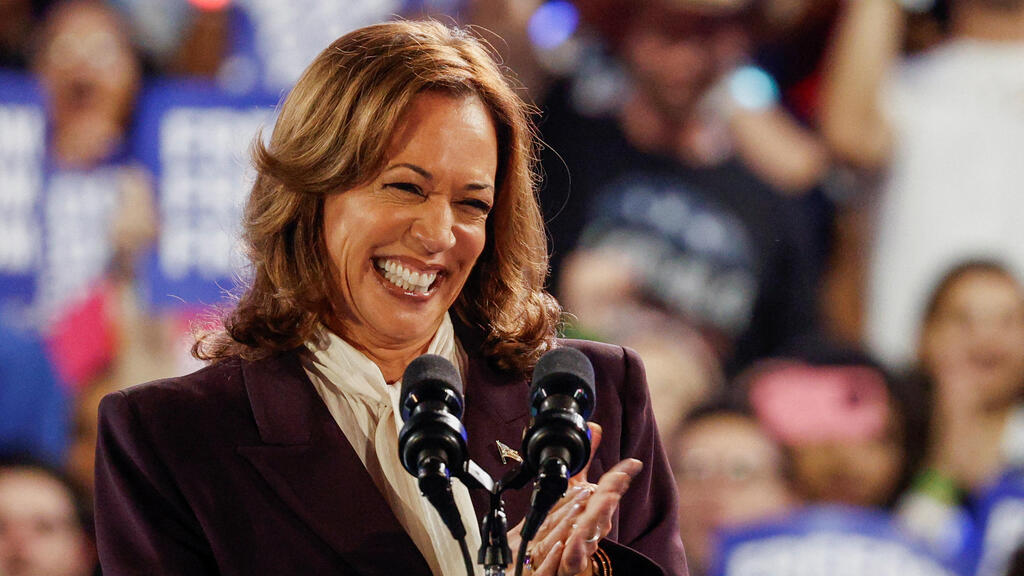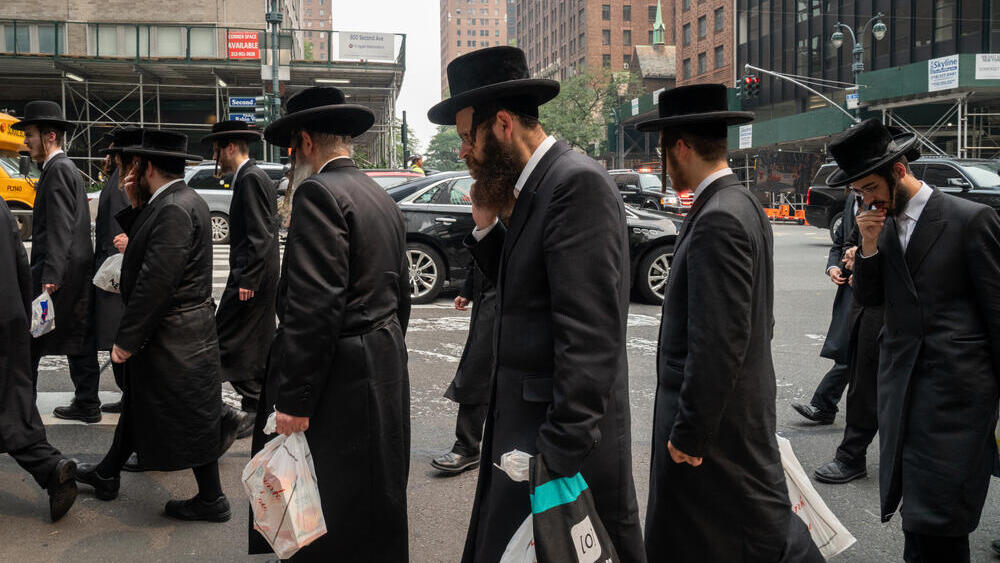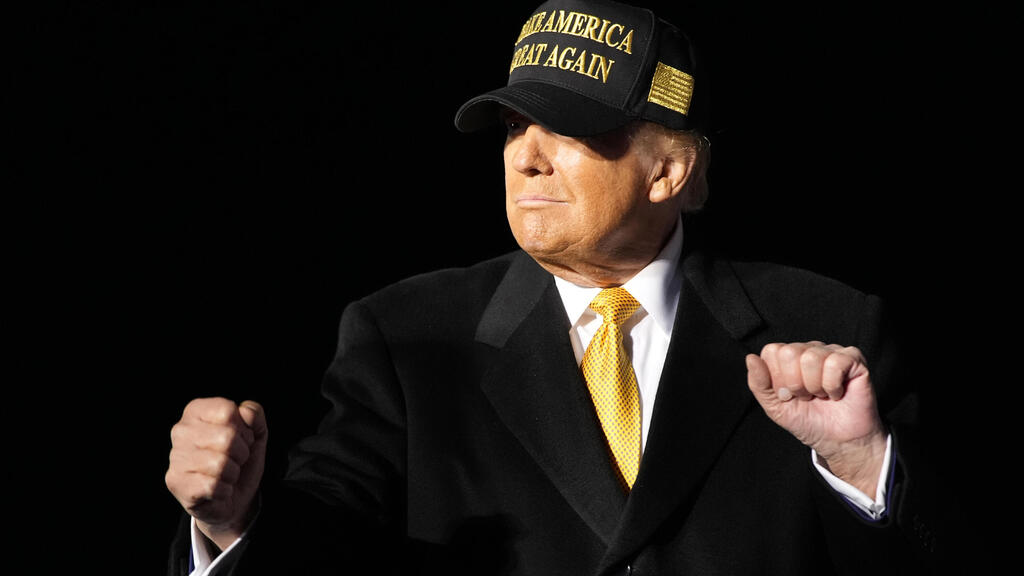Getting your Trinity Audio player ready...
Three women share a booth in a diner. An omelet platter and a plate of black and white cookies sit before them. One of the coffee mugs is emblazoned with the motto: “Life. Liberty. Pastrami.”
The camera pans in. One of the women speaks: “Did you watch the news lately? Israel’s under attack … antisemitism like I never thought I would ever see!”
8 View gallery
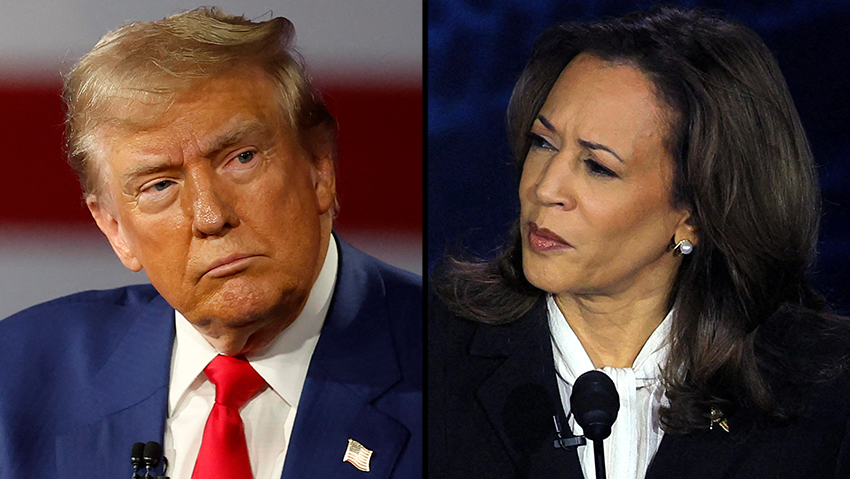

Donald Trump, U.S. Vice President Kamala Harris
(Photo: Kevin Dietsch/AFP, REUTERS/Brian Snyder)
'Trump I never cared for, but at least he’ll keep us safe'
A conversation ensues in which the women discuss a recent attack on their friends’ son at the University of Pennsylvania and [U.S. Vice President] Kamala Harris’s alleged defense of “The Squad,” far-left members of the U.S. House of Representatives. Their faces are etched with anxiety.
“Oy vey!” states one of the women. “You know, Trump I never cared for, but at least he’ll keep us safe.”
The others nod. “Mmhmm. I never voted Republican in my life, but I am voting Trump,” says her friend across the table, driving home the ad’s message, affirmed by all three women who toast one another with their coffee mugs to a hearty “Amen!”
This scene could take place in Anytown, USA. However, several markers inform the viewer that it is situated at a well-known Jewish eatery on Philadelphia’s Main Line called Hymie’s Deli. This ad is one of several that have hit the airwaves within the final stretch of the 2024 U.S. presidential campaign, paid for by the Victory Fund of the Republican Jewish Coalition (RJC).
“With just 16 days left before Election Day, the Jewish community is more engaged and energized than ever before, and will once again play a decisive role in critical battleground states – and the RJC is laser-focused on delivering a victory for President Trump,” RJC head Matt Brooks said in a statement on the day that the ads were released.
The RJC has expended a record $15 million on these ads, appearing on YouTube and in various key media markets. This past week, patrons at Manhattan’s Marlene Meyerson JCC were surprised to see one of these ads on television monitors in the facility’s fitness center, with some audibly exclaiming their displeasure.
The ad’s location is not incidental as the state of Pennsylvania might decide the election. With the memory of the 2018 terror attack on the Tree of Life synagogue in Pittsburgh still painfully fresh, allegations of antisemitism in Philadelphia’s K-12 public school system, and vocal pro-Palestinian protests at the University of Pennsylvania and other campuses, nerves are frayed among the state’s 300,000 Jewish eligible voters.
However, with less than two weeks until the election, Jill Zipin, chair and co-founder of Democratic Jewish Outreach Pennsylvania, exuded confidence in the historically Democratic allegiances of Pennsylvania Jews. She also called the ads “offensive” and peddling Jewish stereotypes.
“We know that 72% of Jews in battleground states are voting for Kamala Harris,” she said.
According to Zipin, polling has consistently proven the overwhelmingly Democratic allegiances of American Jews despite claims by the RJC and other groups.
“Are Jews changing their vote? The answer to that is no. I am so sick and tired of this story,” she said. “Jim Gerstein’s polling of the national Jewish community and battleground states has shown that Jews at 72% are voting Democratic and support Harris. Where you see Jews less supportive of Harris is within the ultra-Orthodox community, given that they are more religiously conservative … and conservative in all senses,” she said.
Zipin stated that while Jews are concerned about the rise in antisemitism across the country, “we understand that the biggest threat to the Jewish community is Donald J. Trump.”
She wonders how Trump-supporting Jews can overlook a variety of alarming statements he has made, including his recent claim that “if he loses the election Jews are to blame. Trump is very transactional,” she added. “If [Israeli Prime Minister] Bibi Netanyahu does not serve his purpose, Trump would throw him under the bus. Donald Trump is not a friend of the Jewish community.”
'Trump is a villain'
This year’s presidential election comes at a particularly intense moment for American Jews, following on the heels of the fall Jewish holiday season and the excruciating first anniversary of the October 7 attacks, which took place on the festival of Simchat Torah, observed this year on October 25.
In light of these events, public programs and panel discussions across the U.S. have focused on which candidate would be better for American Jews.
Speaking at New York’s venerable 92nd Street Y on the day the RJC ads began airing, Alyssa Litoff, executive producer of the PBS documentary "Counting the Vote," used the Yiddish word “shpilkes” in her introduction to the public screening of her film to convey the community’s mood two weeks before the election. This expression conveys anxiety. Members of the audience laughed nervously in agreement.
In sukkahs and around Shabbat tables, on social media and in real life, American Jews are engaged in a fierce debate.
“Trump is a villain. He would be a cartoon villain, if only this were a cartoon,” sociologist Samuel Heilman posted this week on his Facebook page. The American academic and author, who moved to Israel in 2020, articulated his horror at the prospect of a Trump victory.
“Every time you try to give him a break – to grasp his charisma, historicize his ascent, sympathize with his admirers – the sinister truth asserts itself and can’t be squashed down. He will tell another lie so preposterous, or malign another shared decency so absolutely, or threaten violence so plausibly, or just engage in behavior so unhinged and hate-filled that you’ll recoil and rebound to your original terror at his return to power,” he wrote.
Suzy Friedman (not her real name) is a lifelong Democrat who feels on the verge of a nervous breakdown as November 5 approaches. “I’m a ’60s and ’70s kid, I grew up with liberal, Democratic values,” she said. “I absolutely hate Trump … and I’m afraid that if he comes into power he will seek retribution against his enemies and we might be living in a Nazi-like state.”
Friedman’s angst stems from the fact that she also strongly dislikes Kamala Harris, believing her to be woefully inexperienced to serve as the American president. Harris is “clueless,” she complained. “She babbles because she has no concrete answers. How is she supposed to stand up against our enemies?”
A supporter of Hillary Clinton, the Long Island resident has other misgivings against Harris, including her belief that she is a “DEI hire.” She also feels burned by her past support of Barack Obama becasue she believes he empowered Iran to develop its nuclear arsenal and supported Qatar, rumored to be behind the funding of anti-Israel activities on the American college campus and beyond.
'The Harris-Biden administration failed the Jewish community'
The 2016 Trump presidency ushered in a period of unprecedented security, according to Michigan State Senator Aric Nesbitt, a Republican. Nesbitt represents the 20th Senate district in the battleground state of Michigan, home to a Jewish population of nearly 120,000 and 400,000 Arab Americans. The latter have constituted a vocal and visible presence since the October 7 Hamas attacks.
Adding to their anxiety heading into the polls, many Jewish residents of Michigan are apprehensive about outspoken left-wing Squad member and Israel critic Rep. Rashida Tlaib, D-Mich., of Michigan’s 12th Congressional District.
“Under President Trump, historic peace deals were brokered in the Middle East. Since then, the Harris-Biden Administration has completely failed the Jewish community. It’s very clear that the cold-blooded massacre of October 7, followed by the violence and surge in antisemitism in America, would not have occurred under President Trump’s era of peace,” according to Nesbitt.
Recently, numerous high-profile Jewish Americans went public with their new support for Trump, crossing party lines. Among them are long-time centrist voter Bill Ackman, the activist Harvard graduate and CEO of Pershing Square Capital Management. It was Ackman’s efforts that helped to expel Harvard president Claudine Gay on charges of plagiarism and criticism of how the Harvard administration handled anti-Israel protests earlier this year.
On October 23, Ackman appeared on the CNBC podcast "Squawk Pod" with Joe Kernen, Andrew Ross Sorkin and other panelists. While clarifying that he’s “not endorsing everything he’s done as individual,” Ackman held up Trump as the better candidate in an increasingly unstable world. He also pointedly criticized the Biden-Harris administration for not advocating for the hostages taken by Hamas on October 7, some of whom are American.
“Forty-five Americans were killed by Hamas. We still have American hostages being held, which has been completely forgotten and never discussed,” Ackman said.
The lukewarm support provided by the current administration for Israel has seismic consequences, Ackman warned. “Most recently, in the last couple of days, there was some information that came forth that Sinwar told his team, in effect, ‘don’t negotiate any further, pull back from deal because Israel is losing support from the American administration.’”
When former Representative Peter Deutsch, D-Fla., went public two weeks ago with his decision to support the Trump-Vance ticket, the news dominated headlines locally and globally. Appearing as a banner across the top of South Florida’s Sun Sentinel: “Ex-congressman endorses Trump” ignited a firestorm of reader responses, overwhelming the editorial staff. The state has over 672,000 Jews.
Since his announcement, Deutsch has been speaking publicly and writing about the gravity of his decision to vote Republican. “All four of my grandparents were Democrats their entire lives. My parents were Democrats their entire lives. None of the six ever voted for a Republican. I have been a Democrat since I registered to vote at age 18. There is no one who can question my lifelong loyalty to the Democratic Party,” he wrote in a recent opinion piece.
Like Ackman, Deutsch bases his decision on the belief that Trump is better suited to steer a currently unstable world to safety. The RJC instantly tweeted out Deutsch’s words on X: “The world is a very dangerous place, a result in part due to the Biden-Harris foreign policy. I fear it will become far more dangerous if Kamala Harris is elected,” read the October 9 post.
Meanwhile, in the battleground state of North Carolina, Jeffrey Bierer is seeing a lot of enthusiasm among local Jewish voters for Kamala Harris.
'Israel is the issue for them'
The president of the North Carolina Democratic Jewish Caucus, which has 500 members and six chapters over seven counties, Bierer projects that “Jews in North Carolina, in great numbers well about the typical response, will be voting democratic,” he said. A recent estimate places North Carolina’s Jewish population at 49,000, making it roughly 11% of Pennsylvania’s Jewish community, which stands at around 434,000.
Education is a key element in determining the voting choice of local Jews, said Bierer. “People who are well-informed have turned away from Donald Trump and see the need to defeat him,” he added. Local defectors from Trump’s candidacy include “deep AIPAC supporters who are voting for Kamala.”
A self-described outspoken Zionist, Bierer said: “I feel very strongly about Israel and flew there in the weeks after October 7.” The political choices of American Jews are determined by how religiously conservative they are, he added, echoing a common theme. “Israel is the issue for them and they feel more confident in Donald Trump than Vice President Harris.”
Bierer cautioned that Jews worried about Israel’s security following October 7 sometimes jump to the wrong conclusion about Harris’s position on Israel. “An Israeli friend was challenging me, saying that Kamala supposedly agreed that Israel is committing a genocide [in Gaza]. I understood his perception, but I am convinced that perception is not policy and her policy will be to support Israel,” he said.
But Israel is not always the lead concern for some religiously conservative American Jews. A fascinating subplot in the story of the 2024 American Jewish presidential vote is located within Hasidic communities where there are few individual choices and more of a voting bloc scenario.
Chaya Mandelbaum (not her real name) is an insider with her finger on the pulse of voting behaviors, especially among the Satmar communities in Williamsburg, Brooklyn, and Kiryas Joel in Orange County, NY. She said that for the 2024 presidential election the issues are local and national, not global.
“I think that the community is doing what they have always done and do well, in terms of courting different political candidates and elected officials: They are razor-focused on their own agenda,” she said, explaining that the Hasidic community in New York State wants to overturn recent legislation mandating the teaching of substantially equivalent secular education in English, science, math and social studies in their yeshivas.
While they are concerned about rising antisemitism, Israel is often far from their minds, especially as the Satmar community does not recognize Israel as a Jewish state, said Mandelbaum.
The other significant American Hasidic communities – in New Jersey, Maryland and Illinois – are not in 2024 election battleground states. Surprisingly, these enclaves vote on “both sides of the aisle,” and have been great supporters of Democratic New York Governor Kathy Hochul, said Mandelbaum.
Does Mandelbaum project a Hasidic voting bloc for Trump? “It’s hard to say. They are willing to go back and forth across party lines, depending on what leaders are willing to concede but Trump has vowed to get rid of the Department of Education (DOE) and for them, that is positive. They do not want people paying attention to what is happening in their schools,” she said.
It is specifically Trump’s stated intention to abolish the DOE that should make American Jews very nervous, explained Pennsylvania’s Zipin. “Republicans use antisemitism as a talking point but don’t talk about protecting Jewish students from antisemitism on the American college campus. The only way to do this is through Title XI, which is enabled through the DOE, and the GOP wants to defund it. People should feel queasy about this,” she said.
Queasy or confident, American Jews have less than two weeks to vote for the next American president, and all eyes appear to be trained on this statistically tiny but significant community.
Adam Kwasman, head of the Arizona chapter of the Republican Jewish Coalition in the battleground state, projects that “the Arizona Jewish population could very well be the deciding factor in how Arizona votes. Jewish voters in Arizona are extremely interested in policies towards Israel as well as this economy and what we are seeing is both a movement toward Donald Trump” as well as the refusal to vote for “an administration that votes for sanctions for Israel,” he said.
Donald Trump says he speaks frequently with Prime Minister Benjamin Netanyahu
Recent polls put Arizona’s Jewish population at almost 124,000 and growing. Indeed, the state is experiencing a Jewish boom, attracting a growing number of younger families of what Kwasman calls “serious Jews who are reconnecting with their faith, building sukkot, and returning to a world last seen by their grandparents and great-grandparents after October 7. It’s not just about tikkun olam [repairing the world],” he said.
Kwasman mentioned the anti-Israel protests locally and recent incidents at Arizona State University and in Scottsdale, which has the biggest Jewish population in the state. There, “students going to a Chabad table for a Shabbat meal, had rocks thrown at them among other things. Parents are worried about their kids on campus, people are worried about Israel,” he said.
Anticipating a Trump victory, the candidate’s recent visit to the gravesite of the last Chabad Rebbe might be a decisive turning point for local Jews, Kwasman said. He became philosophical when asked about his personal feelings about the controversial GOP candidate. “A vote is not a valentine,” he said. “It is an application of principles. When it comes to Israel and Jewish issues, I’m going with the candidate who visits the Ohel.”
Other Jewish political leaders are inspired by a different ritualistic image. While North Carolina’s Bierer affirms the concerns expressed by Kwasman and Jewish Republicans, he arrived at a different conclusion. “I’m excited by the prospect of seeing a mezuzah on the front door of the White House,” he said, projecting a Harris victory.
Get the Ynetnews app on your smartphone:



